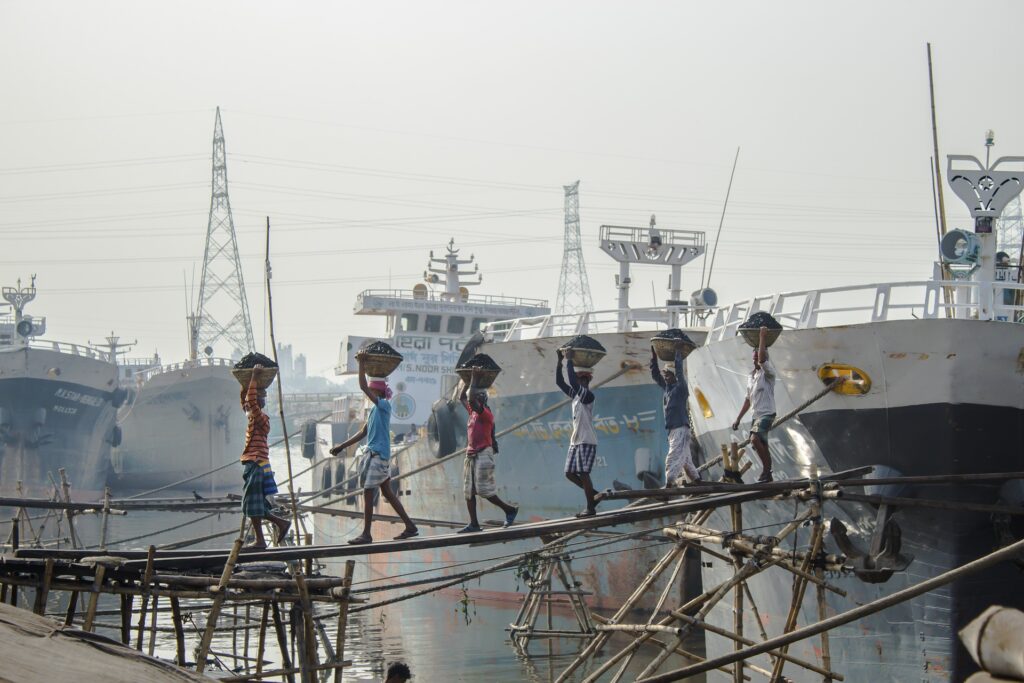Legally-binding instruments are on the rise which ultimately lends more teeth to Human Rights Due Diligence. In a recent webinar, Ksapa invited Didier Bergeret (Consumer Goods Forum) and Lene Wendland, (Office of the UN High Commissioner for Human Rights) to share insights into navigating multiple Human Rights requirements across equally diverse jurisdictions.
To date, 50+ countries have a national action plan to enforce Human Rights due diligence. Most, however, rely on largely voluntary approaches, awareness-raising and capacity-building. Meanwhile, frontrunners in France, the United Kingdom, the Netherlands and California introduced legally-binding instruments to compel businesses to monitor, prevent and address Human Rights and environmental abuses across their supply chains. Slated for 2021, the mandatory Human Rights due diligence EU directive could very well convey the legal certainty the private sector aspires to. That way, it would also ensure responsible players will not be undercut by a broader race to the bottom.
So where do we stand today? Can we require companies to hand over evidence, publicly report investigations and empower victims to seek (and obtain) access to remedy? In this blog, Ksapa shares practical solutions to mainstream Human Rights due diligence solutions – in a manner both granular and scalable.
Soft law, Often a Harbinger of Legally-Binding Human Rights Tools
Lene Wendland (Chief of Business and Human Rights branch, Office of the UN High Commissioner for Human Rights) kicked off the debate by recalling how soft law – namely, the Universal Declaration of Human Rights – evolved into legally-binding conventions for State players to ratify. The convention on fighting torture in fact started off as a declaration!
Such regulatory efforts can also be conducted in non-linear fashion, whereby standards are discussed as they are being legislated upon. Or they can develop from the national level up, as with the United States’ – anti-corruption law. It was adopted by the OECD and, eventually, the United Nations.
A prime example lies in how resolution 45/30 on a child’s right to a clean and healthy environment. Adopted by the UN Human Rights Council, it makes it a legally-binding obligation for businesses to resolve environmental damages they contribute to. And this, from a rights-based perspective. Where pollution standards focused exclusively on environmental risks, the resolution requires companies consider how their operations’ human impacts may have environmental consequences.
The United Nations’ Guiding Principles incidentally turned 10 in 2021. With them, the international community endorsed a framework on business and Human Rights. They consist of 3 pillars for as many target stakeholders – namely States, Corporations and access to remedy. The UNGP upheld the notion of a smart regulatory mix at the regional, national and global level. In so doing, they effectively enforced key players’ responsibility. In that sense, it helps to promote and respect Human Rights by way of comprehensive due diligence and action plans.
Key Players Ready for Change
The UNGP enshrined the concept of Human Rights due diligence, which was consequently incorporated into many corporate operating standards. Consider the OECD Guidelines on Multinational Enterprises, IFC Performance Standards and ISO 26000.
Now, a working group is set to issue a roadmap for the next decade. It is expected to involve certain regulatory developments and should specify the role of financing with regards to Human Rights.
Support from Legally-Binding Domestic Legislations
The UK was undoubtedly the frontrunner in adopting legally-binding Human Rights instruments, with its Modern Slavery Act (2015). The scope of that law expanded when the French adopted their Duty of Vigilance law in 2017. The Australia followed suit with its own Modern Slavery Act. As did the Netherlands with the Child Labor Due Diligence Law of 2019. Meanwhile, Germany’s national action plan initially opted to lay out voluntary due diligence as an option for companies. Now, it is going the mandatory route. Indeed, the Parliament passed a national law and called for a European supply chain directive.
In the face of so many legally-binding Human Rights legislations at the national level, the UNO is bound to step in and align expectations. The ultimate goal is to scale implementation. A process is also underway for a Business and Human Rights treaty with a strong Human Rights due diligence component.
Growing Alignment Across Corporate Functions
The Corporate Human Rights Benchmark rather brutally made the case for corporate Human Rights due diligence. Indeed, of the 230 companies across all sectors it assessed in 2020, 46% failed to score any points at all that would align with the much-anticipated European directive!
That said, corporates have heavily invested the Human Rights space, if only through declarative initiatives. Of particular note was the 2020 call to action from cocoa companies. It demanded the European Union (by far the largest importer and consumer in the world), strengthen corporate Human Rights and environmental due diligence requirements across the global cocoa supply chain. Support for a European framework on mandatory Human Rights and environmental due diligence similarly arose from a coalition of 26 companies, business associations and initiatives.
First, there was the looming threat of high-profile transnational lawsuits. Now, Boards of Directors and C-Suites increasingly examine Human Rights implications for their business and operations. The Human Rights lens indeed not only supports internal dialog around Opex and Capex. Proactive Human Rights risk mitigation policies in fact decrease unnecessary costs… when they do not generate savings outright.
Innovative Collaborative Approaches
Companies are also seeking contractually-binding conventions with trade-unions, much like the Bangladeshi Accord. Following the Rana Plaza collapse, 200+ garment brands and retailers signed a legally-binding Accord on Fire and Building Safety in Bangladesh with global union federations and Bangladeshi trade-union affiliates. The document requires corrective action to remediate hundreds of thousands safety hazards. There are indeed some 1,600 factories with more than 2 million workers in Bangladesh alone. Though primarily centered on worker safety, both the European Commission and ILO cite this Accord as a blueprint for mandatory Human Rights due diligence.
Much in the same spirit, key sectors are mobilizing to mainstream Human Rights due diligence as a way to mitigate industry-wide Human Rights risks. The Tech sector for instance backs the UN-Led B-Tech flagship project in an effort to engage States, regulators and private players. The goal is to align digital technologies and the UNGP. This program notably includes an investor track to provide specific guidance in embedding these standards in their own selection processes.
Human Rights Increasingly Condition Access to Capital
Much like their corporate counterparts, investors have been keen to step up their Human Rights Due Diligence efforts. Chief among them, the Investor Alliance for Human Rights issued a statement from investors representing $5 trillion, calling on governments to make Human Rights due diligence mandatory throughout investment lifecycle.
The Principles for Responsible Investment team was also quick to recognize the leadership opportunity in promoting responsible investment policies fully cognizant of their Human Rights risks. Signatories will indeed have to better apprehend the investment implications of their social, environmental and governance (ESG) issues. Ultimately embedding the latter in their investment and ownership decision-making processes.
Finally, the EU Green Taxonomy was designed to help investors, companies, issuers and project promoters navigate thejr transition towards a low-carbon, resilient and resource-efficient economy. To that end, the Taxonomy encourages the private sector to enforce a strict Do No Significant Harm principle. This involves key environmental objectives and minimum safeguards, inclusive of the OECD Guidelines on Multinational Enterprises and the UNGP).
A Maturity Approach to Legally-Binding Human Rights Due Diligences
The Consumer Goods Forum brings global retailers and manufacturers to foster collective action on key challenges impacting the industry. Chief among these are Human Rights, prompting Didier Bergeret (Social Sustainability and SSCI Director) to acknowledge the impetus around corporate action in that arena. Recognizing the need for businesses to work together, the organization indeed launched a CEO-led Human Rights Coalition to End Forced Labor acknowledging the saliency of this issue in the consumer goods industry.
The initiative is moving beyond the difficulty to address this sensitive issue and identify risk occurrence. Above all the initiative commits the broader industry to:
- Implement human rights due diligence systems targeting forced labor;
- Support responsible recruitment markets;
- Support a focused movement with all relevant stakeholders to jointly expedite the elimination of forced labor.
The result was to outline a 6-step harmonized Human Rights approach, empowering member to better anticipate growing regulatory developments. That way, they will be able to navigate uncertainties collectively. From there, they might embed these principles in their corporate strategy. Didier Bergeret stressed the importance of adopting a maturity approach. This, to help all businesses step up their commitments regardless of the sophistication of their efforts. To that end, the coalition distinguishes a launch and leadership track. This fosters a common understanding of Human Rights risks as a sound starting point for collective action.
Actionable Convergences Between Human Rights and Environmental Due Diligence
The CGF identified actionable convergences between Human Rights and environmental due diligence processes. This brought the organization to involve another two of its ongoing initiatives. Namely, the Forest Positive and Sustainable Supply Chain initiative. Together, they empower socio-environmental action backed by credible sustainability standards. This of particular importance in relations to fighting deforestation and protecting climate defenders.
Such efforts are well encapsulated in the CGF’s work on palm oil in Malaysia. The organization indeed encourages member organizations to practice what they preach. It supports them to activate standards across their operations before eventually partnering with their value chain. This effectively moves the needle beyond conventional buyer-supplier relationships, with organizations entering more proactive value-sharing partnerships.
This approach also entails engaging public players on mainstreaming responsible recruitment practices. By embedding Human Rights in the broader sustainability landscape, the CGF bolsters comprehensive corporate action on Human Rights. And this, at company level. Looking to the future, CGF initiatives are set to deliver cross-cutting action. These efforts are indeed designed for maximum replicability, across commodities and countries.
Heading the Call for Legally-Binding Human Rights Due Diligences
Enforcement Mechanisms
Both speakers agreed on Human Rights due diligence laws being only as good as their enforcement mechanisms. In short, naming-and-shaming no longer cut it, nor do reputational incentives for businesses to take meaningful action. Now, regulatory efforts increasingly include potential penalties, including civil fines, criminal sanctions and the disqualification of directors. The New South Wales Modern Slavery Act can for instance enforce financial penalties up to AUD $1.1 million.
A Smart Mix of Legislative Measures
Lene Wendland stressed a new frontier lies in ensuring transnational alignment in delivering a smart mix of Human Rights legislation at scale. This could involve the market itself incentivizing key players aptly managing their Human Rights risks as part of a broader risk management and financial sustainability system.
Didier Bergeret in fact underlined the importance of rewarding good behavior to level the playing field and provide key players with a safe space. Only then may they not shy away of disclosing their issues and helping track potential criminal behavior. Beyond imposing another reporting exercise, future regulatory efforts would therefore do well to foster greater transparency. That is after a sound first step in the global drive towards enforcing and promoting Human Rights.
Covid-19 Drives Home the Business Case for Legally-Binding Human Rights Tools
In the context of the Covid-19 crisis, certain players may however be tempted to entered damage control and shy away from proactive Human Rights investment. Many in that situation struggled with their logistics, generating dire impacts for workers – and migrants workers in particular. With that in mind, the CGF called for seafarers to be recognized as essential workers to be allowed to return home. This, to put an end to a humanitarian emergence conducive to indentured labor.
That said, the business case for Human Rights may have become even stronger for both policy-making and corporate action. The pandemic shed uncomfortable light on the limits of our current supply chain models, demonstrating the benefits of integrated risk management, where Human Rights are folded into broader strategies. In short, Human Rights policies are no longer an add-on, they determine the long-term resilience of the underpinning organizations.
Conclusion | A 3-Step Approach to Advancing Human Rights
We currently health and economic crises, a volatile investment world and changing politics. So how do we navigate the uncertainties of Human Rights due diligence? Here are 3 steps to adapting to such changes and anticipating future developments:
- Pursue efforts to pinpoint socio-environmental risks across corporate activities and value chains. Above all, take responsibility and structure cross-cutting risk reduction efforts;
- Highlight the positive impacts of existing activities. Implement impact measurement systems in line with international reference standards – such as the GIIN’s IRIS+ system or the Impact Management Project;
- Integrate social and environmental impacts as a fundamental criterion from the inception of new activities or products onwards.
Whichever way we look at Human Rights due diligence – that is, from a risk remediation, compliance or reporting perspective – businesses and investors will find it increasingly difficult to just wait and see. With that in mind, mapping Human Rights and environmental risks is an essential first step for businesses and investors alike. From there, it will be a matter of setting up an action plan, verifying and collecting feedback on the impact of their measures and, finally, documenting the whole process.
As a sustainability and corporate responsibility consultant, Margaux joined Ksapa with international experience in public, private and non-profit organizations. She had previously worked for the Deloitte and Quantis sustainability consultancies, lobbied for environmental research on behalf of the INRA and contributed to Total’s extra-financial reporting.
A Franco-American citizen, Margaux holds sustainability certifications from the IEMA and Centrale-Supélec on top of a Masters degree in History, Communications, Business and Internal Affairs.
She is fluent in French, English and Spanish.






